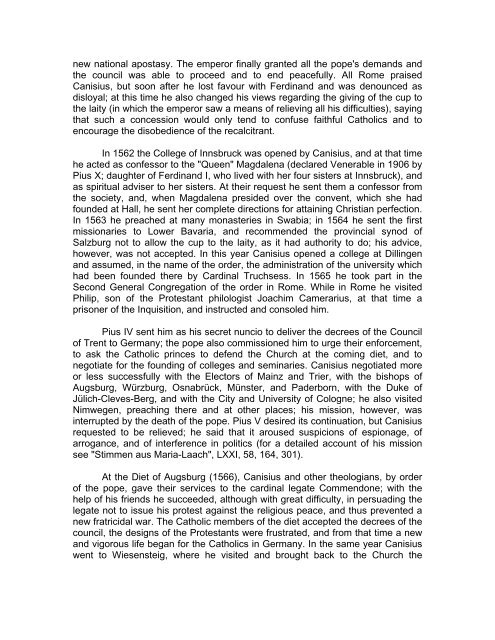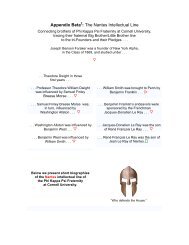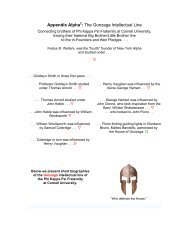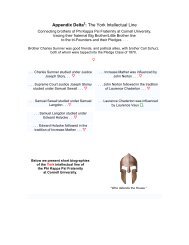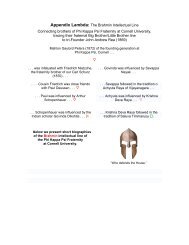Gondar - Phi Kappa Psi
Gondar - Phi Kappa Psi
Gondar - Phi Kappa Psi
Create successful ePaper yourself
Turn your PDF publications into a flip-book with our unique Google optimized e-Paper software.
new national apostasy. The emperor finally granted all the pope's demands and<br />
the council was able to proceed and to end peacefully. All Rome praised<br />
Canisius, but soon after he lost favour with Ferdinand and was denounced as<br />
disloyal; at this time he also changed his views regarding the giving of the cup to<br />
the laity (in which the emperor saw a means of relieving all his difficulties), saying<br />
that such a concession would only tend to confuse faithful Catholics and to<br />
encourage the disobedience of the recalcitrant.<br />
In 1562 the College of Innsbruck was opened by Canisius, and at that time<br />
he acted as confessor to the "Queen" Magdalena (declared Venerable in 1906 by<br />
Pius X; daughter of Ferdinand I, who lived with her four sisters at Innsbruck), and<br />
as spiritual adviser to her sisters. At their request he sent them a confessor from<br />
the society, and, when Magdalena presided over the convent, which she had<br />
founded at Hall, he sent her complete directions for attaining Christian perfection.<br />
In 1563 he preached at many monasteries in Swabia; in 1564 he sent the first<br />
missionaries to Lower Bavaria, and recommended the provincial synod of<br />
Salzburg not to allow the cup to the laity, as it had authority to do; his advice,<br />
however, was not accepted. In this year Canisius opened a college at Dillingen<br />
and assumed, in the name of the order, the administration of the university which<br />
had been founded there by Cardinal Truchsess. In 1565 he took part in the<br />
Second General Congregation of the order in Rome. While in Rome he visited<br />
<strong>Phi</strong>lip, son of the Protestant philologist Joachim Camerarius, at that time a<br />
prisoner of the Inquisition, and instructed and consoled him.<br />
Pius IV sent him as his secret nuncio to deliver the decrees of the Council<br />
of Trent to Germany; the pope also commissioned him to urge their enforcement,<br />
to ask the Catholic princes to defend the Church at the coming diet, and to<br />
negotiate for the founding of colleges and seminaries. Canisius negotiated more<br />
or less successfully with the Electors of Mainz and Trier, with the bishops of<br />
Augsburg, Würzburg, Osnabrück, Münster, and Paderborn, with the Duke of<br />
Jülich-Cleves-Berg, and with the City and University of Cologne; he also visited<br />
Nimwegen, preaching there and at other places; his mission, however, was<br />
interrupted by the death of the pope. Pius V desired its continuation, but Canisius<br />
requested to be relieved; he said that it aroused suspicions of espionage, of<br />
arrogance, and of interference in politics (for a detailed account of his mission<br />
see "Stimmen aus Maria-Laach", LXXI, 58, 164, 301).<br />
At the Diet of Augsburg (1566), Canisius and other theologians, by order<br />
of the pope, gave their services to the cardinal legate Commendone; with the<br />
help of his friends he succeeded, although with great difficulty, in persuading the<br />
legate not to issue his protest against the religious peace, and thus prevented a<br />
new fratricidal war. The Catholic members of the diet accepted the decrees of the<br />
council, the designs of the Protestants were frustrated, and from that time a new<br />
and vigorous life began for the Catholics in Germany. In the same year Canisius<br />
went to Wiesensteig, where he visited and brought back to the Church the


